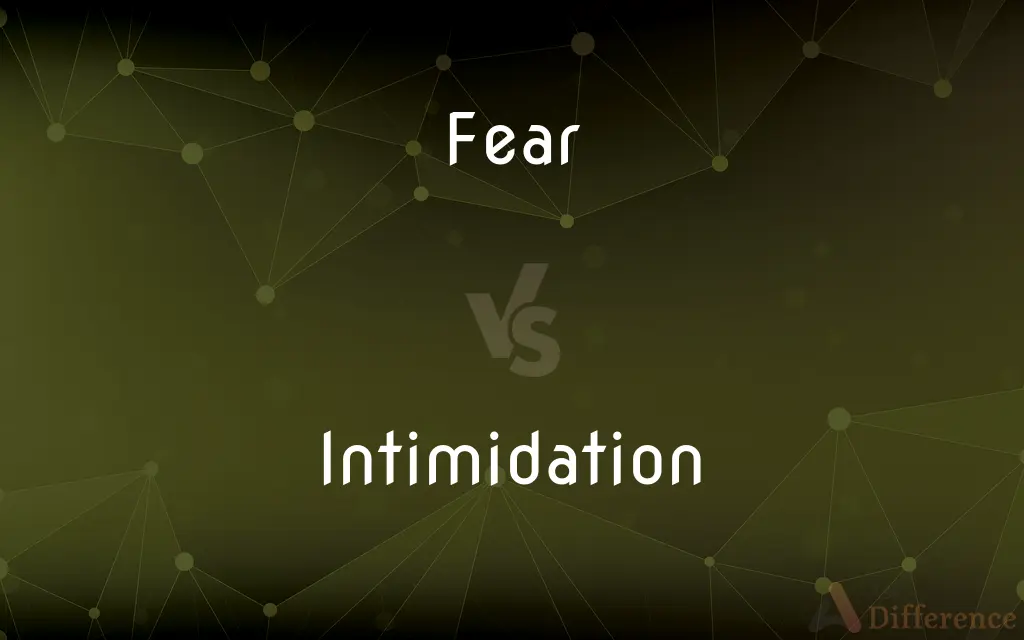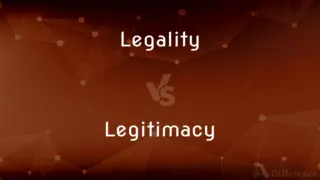Fear vs. Intimidation — What's the Difference?
By Fiza Rafique & Maham Liaqat — Updated on April 8, 2024
Fear is an emotional response to perceived threats, while intimidation is a deliberate act of making others feel fear or inferiority.

Difference Between Fear and Intimidation
Table of Contents
ADVERTISEMENT
Key Differences
Fear is an internal, instinctive emotional reaction to potential danger, triggering a fight-or-flight response, whereas intimidation is an external tactic used by individuals or groups to induce fear, compliance, or submission in others. Fear can exist without any external stimulus purely based on internal perceptions and past experiences, while intimidation requires an intimidator's deliberate actions aimed at making someone feel threatened or coerced.
Fear often arises involuntarily in response to something perceived as a threat to one's safety or well-being, ranging from physical danger to psychological distress. On the other hand, intimidation is a calculated behavior intended to influence or control others by instilling fear. This can be through verbal threats, physical aggression, or psychological manipulation.
While fear can be a momentary feeling or a prolonged state of anxiety affecting an individual's psychological and physical well-being, intimidation is typically a dynamic process where one party seeks to assert dominance or control over another. The effectiveness of intimidation relies on the ability to exploit the fears of the intimidated party.
Fear can manifest in various forms such as phobias, generalized anxiety, or panic attacks, each with its underlying causes and triggers. Intimidation, however, is a social or interpersonal dynamic, often reflecting power imbalances, where the intimidator uses their position, strength, or influence to elicit fear.
Fear is a universal emotion that can be experienced by anyone regardless of age, gender, or background. It serves as a protective mechanism, alerting individuals to danger and preparing them to deal with it. Intimidation, while it can be experienced by anyone, is often used as a tool by those seeking to exploit, control, or dominate others, making it a behavior rather than a natural emotional response.
ADVERTISEMENT
Comparison Chart
Nature
Emotional response
Deliberate act
Origin
Internal perceptions or external threats
Actions of another person or group
Purpose
Alerts to danger, protective
To control, coerce, or assert dominance
Manifestation
Can be physical (fight-or-flight) or emotional
Usually psychological or physical coercion
Impact on Self
Affects mental and physical well-being
Triggered by external actions, affecting well-being
Compare with Definitions
Fear
Fear is an innate emotional response to perceived danger.
The sound of footsteps behind her in the dark alley triggered a sharp sense of fear.
Intimidation
Intimidation is a tactic used to manipulate or control others through fear.
The boss used intimidation to enforce overtime without pay.
Fear
It serves as a natural protective mechanism that alerts individuals to potential threats.
His fear of heights made him extremely cautious on the ladder.
Intimidation
Intimidation isn't always overt and can be exercised through subtle psychological pressure.
His constant surveillance was a form of intimidation, ensuring compliance.
Fear
Fear can vary greatly in intensity from mild unease to overwhelming terror.
Her fear of spiders ranged from mild discomfort to paralyzing dread upon seeing one.
Intimidation
It may involve explicit or implicit threats to achieve compliance.
The email was filled with intimidation, suggesting dire consequences for non-compliance.
Fear
Often, fear is not based on actual threats, leading to irrational fears or phobias.
Despite knowing it was illogical, his fear of being alone in the dark persisted.
Intimidation
It involves exerting power or influence over others to achieve a certain outcome.
She used intimidation to maintain her position in the group.
Fear
Fear can influence behavior, prompting avoidance, escape, or confrontational actions.
The fear of failure motivated her to study harder for the exams.
Intimidation
Often occurs in social or interpersonal contexts, reflecting power imbalances.
The senior students used intimidation to assert dominance over the new students.
Fear
Fear is an emotion induced by the perception or recognition of phenomena which can pose a danger or threat. Fear causes physiological changes and therefore may produce behavioral changes, such as mounting an aggressive response or fleeing the threat.
Intimidation
Intimidation (also called cowing) is intentional behavior that "would cause a person of ordinary sensibilities" to fear injury or harm. It is not necessary to prove that the behavior was so violent as to cause mean terror or that the victim was actually frightened.Threat, criminal threatening (or threatening behavior) is the crime of intentionally or knowingly putting another person in fear of bodily injury.
Fear
A very unpleasant or disturbing feeling caused by the presence or imminence of danger
Our fears intensified as the storm approached.
Intimidation
To make timid; fill with fear
The size of the opposing players intimidated us.
Fear
A state or condition marked by this feeling
Living in constant fear of attack.
Saved as much as he could for fear of losing his job.
Intimidation
To coerce or deter, as with threats
The police intimidated the suspect into signing a false statement.
Fear
A feeling of disquiet or apprehension
A fear of looking foolish.
Intimidation
The act of making timid or fearful or of deterring by threats; the state of being intimidated
Fear
A reason for dread or apprehension
Being alone is my greatest fear.
Intimidation
The act of making timid or fearful or of deterring by threats; the state of being intimidated; as, the voters were kept from the polls by intimidation.
The king carried his measures in Parliament by intimidation.
Fear
Extreme reverence or awe, as toward a deity.
Intimidation
The act of intimidating a weaker person to make them do something
Fear
To be afraid or frightened of
A boy who fears spiders.
Intimidation
The feeling of discouragement in the face of someone's superior fame or wealth or status etc.
Fear
To be uneasy or apprehensive about
We all feared what we would see when the grades were posted.
Intimidation
The feeling of being intimidated; being made to feel afraid or timid
Fear
To consider probable; expect
I fear you are wrong. I fear I have bad news for you.
Intimidation
A communication that makes you afraid to try something
Fear
To revere or be in awe of (a deity, for example).
Fear
To be afraid
Your injury is minor. Don't fear.
Fear
To be uneasy or apprehensive
We fear for the future of the business.
Fear
(uncountable) A strong, uncontrollable, unpleasant emotion or feeling caused by actual or perceived danger or threat.
He was struck by fear on seeing the snake.
Fear
(countable) A phobia, a sense of fear induced by something or someone.
Not everybody has the same fears.
I have a fear of ants.
Fear
(uncountable) Terrified veneration or reverence, particularly towards God, gods, or sovereigns.
Fear
(transitive) To be afraid of (something or someone); to consider or expect (something or someone) with alarm.
I fear the worst will happen.
Fear
(intransitive) To feel fear.
Never fear; help is always near.
Fear
To worry about, to feel concern for, to be afraid for.
She fears for her son’s safety.
Fear
(transitive) To venerate; to feel awe towards.
People who fear God can be found in Christian churches.
Fear
(transitive) To regret.
I fear I have bad news for you: your husband has died.
Fear
To cause fear to; to frighten.
Fear
To be anxious or solicitous for.
Fear
To suspect; to doubt.
Fear
(dialectal) Able; capable; stout; strong; sound.
Hale and fear
Fear
A variant of Fere, a mate, a companion.
Fear
A painful emotion or passion excited by the expectation of evil, or the apprehension of impending danger; apprehension; anxiety; solicitude; alarm; dread.
Fear is an uneasiness of the mind, upon the thought of future evil likely to befall us.
Where no hope is left, is left no fear.
Fear
Apprehension of incurring, or solicitude to avoid, God's wrath; the trembling and awful reverence felt toward the Supreme Being.
I will put my fear in their hearts.
I will teach you the fear of the Lord.
Render therefore to all their dues; tribute to whom tribute is due . . . fear to whom fear.
Fear
That which causes, or which is the object of, apprehension or alarm; source or occasion of terror; danger; dreadfulness.
There were they in great fear, where no fear was.
The fear of your adventure would counsel you to a more equal enterprise.
Fear
To feel a painful apprehension of; to be afraid of; to consider or expect with emotion of alarm or solicitude.
I will fear no evil, for thou art with me.
Fear
To have a reverential awe of; to be solicitous to avoid the displeasure of.
Leave them to God above; him serve and fear.
Fear
To be anxious or solicitous for; now replaced by fear for.
The sins of the father are to be laid upon the children, therefore . . . I fear you.
Fear
To suspect; to doubt.
Ay what else, fear you not her courage?
Fear
To affright; to terrify; to drive away or prevent approach of by fear.
Fear their people from doing evil.
Tush, tush! fear boys with bugs.
Fear
To be in apprehension of evil; to be afraid; to feel anxiety on account of some expected evil.
I exceedingly fear and quake.
Fear
An emotion experienced in anticipation of some specific pain or danger (usually accompanied by a desire to flee or fight)
Fear
An anxious feeling;
Care had aged him
They hushed it up out of fear of public reaction
Fear
A profound emotion inspired by a deity;
The fear of God
Fear
Be afraid or feel anxious or apprehensive about a possible or probable situation or event;
I fear she might get aggressive
Fear
Be afraid or scared of; be frightened of;
I fear the winters in Moscow
We should not fear the Communists!
Fear
Be sorry; used to introduce an unpleasant statement;
I fear I won't make it to your wedding party
Fear
Be uneasy or apprehensive about;
I fear the results of the final exams
Fear
Regard with feelings of respect and reverence; consider hallowed or exalted or be in awe of;
Fear God as your father
We venerate genius
Common Curiosities
What triggers fear?
Fear is triggered by perceived threats to safety or well-being.
Is intimidation always intentional?
Yes, intimidation is a deliberate act meant to induce fear or compliance.
Are phobias a form of fear?
Yes, phobias are intense, irrational fears of specific objects or situations.
Do animals experience fear?
Yes, animals also experience fear, primarily as a survival mechanism.
Can intimidation be legal?
Some forms of intimidation, especially those that threaten physical harm, are illegal.
Can fear be positive?
Fear can serve a protective role, alerting us to danger and helping to ensure our safety.
How does one overcome intimidation?
Overcoming intimidation often involves building self-confidence, seeking support, and setting clear boundaries.
Is fear always a negative experience?
While often uncomfortable, fear is not always negative and can encourage growth and caution.
Can fear be managed or reduced?
Yes, through various strategies like exposure therapy, counseling, and stress management techniques, fear can be managed.
What role does culture play in fear?
Cultural factors can influence what we fear and how we express it.
How do power dynamics affect intimidation?
Power dynamics play a significant role, with those in positions of power often being the intimidators.
Is intimidation a form of bullying?
Yes, intimidation can be a form of bullying, especially when used to exert control or dominance over others.
Can intimidation be non-verbal?
Intimidation can be non-verbal, such as through body language or implicit threats.
How do children respond to intimidation?
Children may respond to intimidation with fear, withdrawal, or by seeking help from adults.
What is the difference between fear and anxiety?
Fear is a response to a known or understood threat, whereas anxiety involves apprehension without a specific or clear threat.
Share Your Discovery

Previous Comparison
Legality vs. Legitimacy
Next Comparison
Dam vs. SluiceAuthor Spotlight
Written by
Fiza RafiqueFiza Rafique is a skilled content writer at AskDifference.com, where she meticulously refines and enhances written pieces. Drawing from her vast editorial expertise, Fiza ensures clarity, accuracy, and precision in every article. Passionate about language, she continually seeks to elevate the quality of content for readers worldwide.
Co-written by
Maham Liaqat













































